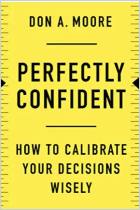Melden Sie sich bei getAbstract an, um die Zusammenfassung zu erhalten.

Melden Sie sich bei getAbstract an, um die Zusammenfassung zu erhalten.
Dylan Evans
Risk Intelligence
How to Live with Uncertainty
Free Press, 2012
Was ist drin?
What do you know, and how sure are you that you know it?
Recommendation
Risk intelligence expert Dylan Evans takes readers out of the clear but false light of certainty and into the challenging shadows of uncertainty. He defines “risk intelligence,” discusses factors shaping your relationship to risk and knowledge, and walks you through the meaning of this information. The result is entertaining but it carries serious implications. If you work through the risk intelligence self-test Evans offers in the book and online to help you determine your “risk quotient,” you may be humbled. getAbstract recommends Evans’s instructive exploration to investors, strategists and anyone interested in being more self-aware or making better decisions.
Summary
About the Author
Dylan Evans, who has a PhD in philosophy, founded Projection Point, a consultancy that specializes in “risk intelligence.” His books include Emotion: The Science of Sentiment.




















Comment on this summary